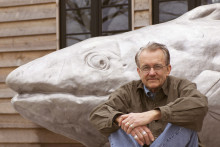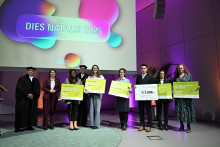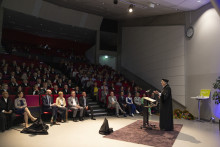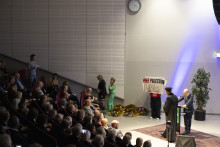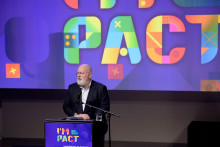To call Tufte's current abode secluded would be something of an understatement. Hogpen Hill Farms is a hidden outpost near the forgettable town of Woodbury, Connecticut and approx. 150 kilometres north of New York City. Tufte (74) calls it his studio and it is a place that is anything but forgettable. On the contrary it is serene, imposing, breathtaking… unforgettable. And that is precisely the impression Tufte wants to leave on people when they visit his studio – a sculpture park and tree nursery; an opportunity that is only available to the public one day each year when they can immerse themselves in his world on a silent walking and visual tour of a 95-hectare site filled with sculptures that in total add up to over one million kg in weight. Hidden somewhere in this huge studio is Tufte's home: a red farmhouse on the shores of a small lake where a boat in the shape of a black swan lies moored.

Intense viewing
‘ET, come on in,’ sounds his welcome, and it doesn't take long before he is on a roll. Tufte's two worlds – high science and high art, as he calls them himself – are inextricably bound to each other by a phenomenon that Tufte refers to as the thinking eye. ‘Both demand intense viewing – and translating that viewing into a representation, outcome or object. The process involved is detached, there are no disciplines that apply to the process. And disciplines are unimportant to me in any event. Many of the disciplines you find at universities were created hundreds of years ago. They are completely at odds with the world as it is today.’
Tufte chooses his words carefully, but is keenly aware that much of what he says is often construed as lying somewhere between downright rude and very frank. ‘Mediocrity busies itself with disciplines. The rest of us just get to work in the studio. Disciplines are all about nouns, doing stuff, verbs.’ Tufte goes on: ‘I always wanted to be a professor, but I'm still not sure what that means exactly. I've always had a love for the academic world because of its abundance of smart young people and clear thinkers, certainly not because of its penchant for dividing the world up into disciplines.’
Making something
Tufte has a long and impressive track record in the academic world and this is actually the eighth time he will be awarded an honorary doctorate. He gained his bachelors and masters degrees in statistics at Stanford University. Four years later he completed his PhD in political science at Yale University. After working as a lecturer and professor of political science at another renowned university, Princeton, he returned to Yale to take up a position as Professor of Political Science, Statistics, and Computer Science before retiring in 1999. During that time he wrote four books on data visualisation, with a combined sales total of two million. His fifth book, The Thinking Eye, is due for publication soon. ‘I have a very short span of attention’, says Tufte. ‘I've walked away from success on somewhere between five and ten occasions in my life. For example, I could have gone much further in political science but I just wanted to try something else. My personal motto is: if I don't do something different then it feels like I'm not doing anything at all. There are so many fascinating things in the world that I want to understand, to think about, to contribute to.’
He prefers to think in terms of problems – and how to solve them. And Tufte likes to think with his hands, too. He applied the same principles to the writing, designing and publication of his own books. ‘Most books about data visualisation – especially academic ones – are plain ugly. I wanted to show that it was possible to produce books that are beautiful, clever and elegant, and not just full of academic drivel about data and design but more about actually making something.’
Caravan to Mars
Time to move outdoors - the place where Tufte's ideas manifest themselves in other forms. While his trusty four-legged friend, Ace, chases happily after a tennis ball, Tufte explains, patiently but passionately, his works of art, which stretch out diagonally (unintentionally so, he says) across the landscape. One that immediately catches the eye is a caravan sitting on a huge stand. ‘That one is designed to go to Mars. Because it is really quite absurd to think we can send people to Mars. According to Tufte, the surrounding artworks depict the history of space travel. And what about the future? ‘I think we should send a weapon or a tank, with the words “we’ve come to kill you” included as a hidden message.’

ET calls this a subtle but valuable commentary on communication. ‘Images and the laws of nature are both universal. Words, however, are very local. Almost everyone has visual access to everything, except for words. Words – whenever they form a sentence – prevent you from seeing anything else. And that gives rise to a confirmation bias.’ In Tufte's own words: ‘there is knowledge that is eternally true and we call that science. But the same might apply to other fields, too.’
Intellectual poverty
With his fifth book, The Thinking Eye, Tufte wishes to dig deeper into how we view and understand things. ‘Can we apply the same analytical view we use when looking at a spreadsheet or a poem to when we are looking at the world? Can we view the world with the same intensity? This landscape art represents an attempt to understand the material. And, more importantly, the sky. I think more about the sky that I do about the material. I can hang a beautiful painting on my wall but after three months I just won't see it anymore. But every time I go outside I find myself in a new world. The space changes when the sky changes, or whenever the viewer moves, when it's raining or windy, when the seasons change, when the world turns. That is an infinitely more complex optical experience.’
Tufte intends to concentrate purely on high science and high art. He has had his fill of what he calls the ‘war against stupidity’. In 2003 he wrote an essay on what is wrong about using PowerPoint. He also referred to a government website as being intellectually impoverished. ‘A polite way of saying that it is dumb’, laughs Tufte. ‘However, my criticism was understood immediately both by those who were responsible for the design and those who were responsible for the content.’ Tufte adds: ‘I did my bit in the war against stupidity, but it's just that there is so much of it in the world. It exhausts you. I think that Trump is the best embodiment of intellectual poverty that we have. The worst combination imaginable of anger, hypocrisy, hate and ignorance. All wrapped up in a bully.’

Hidden agenda
He says that he gets more energy from the positive things in life and one of those things is touring the country to give lectures. Tufte calls it his hidden agenda: ‘Making smart people smarter’. His studio, Hogpen Hill Farms, will continue to be just that - a studio - for the time being. ‘People can visit whenever I'm not there. My job is to make stuff, not to run a museum.’ He intends to leave his huge estate to a foundation that will be free to decide what to do with it. But until that time he hopes to remain productive for at least another twenty years – in books and in art. ‘I've got enough to say and do for another twenty years.’


